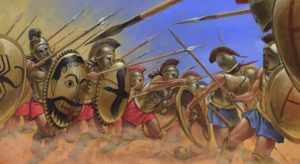ArlenJ.com
April 11, 2020

The English term “spartan” is derived from the Ancient Greek city-state by the same name. The Peloponnesian Wars consisted of two prolonged conflicts between Athens and Sparta. The First Peloponnesian War spanned 15 years, from 460-445 BCE. The Thirty-Years Treaty ended the war. But tensions remained high between the two city-states.
Athens and Sparta were less than 100 miles apart in distance. The values and lifestyles of the two city-states, however, were much further apart. Athens was ruled by archons, democratically-elected rulers. Sparta was ruled by monarchs and oligarchs. Athenian children learned the arts and sciences from a young age. Spartan boys were subject to mandatory conscription.
These and other differences led to the Second Peloponnesian War that spanned a quarter century. The Athenians suffered early setbacks, including a plague in 430 BCE that killed General Pericles. But their naval might kept them competitive and prevented direct confrontation with Spartan soldiers. Athens was well-aware of the discipline and intense agōgē training of the Spartan. Thus the Athenians attacked from a distance as much as possible. Despite several naval victories, Athens could not match the strength of the Spartan military on land. The Athenians surrendered in 404 BCE.
Agōgē principles
Sparta, as the name indicates, valued self-denial and selflessness. Indoctrination into Spartan culture literally commenced as soon as the child exited the womb. Spartan military examined every child that was born. Any babies deemed to have weaknesses were either left for dead or enslaved. Babies that survived initial exams were bathed in wine to determined their endurance and resilience.
Boys lived with their parents (or mother and maid) until age seven. They joined the Agōgē and lived in barracks thereafter. Boys survived only by stealing and scavenging food. Harsh discipline and deprivation were their realities. They took rigorous citizenship tests at age 20. Those who passed became full citizens. The failures became middle class “perioeci” or “perioikos.” New citizen men were required to marry but remain in the barracks until age 30. They lived with their families thereafter, but remained in the military until age 60.
Girls were also enrolled in schools outside the home at age seven. They went through intense physical training similar to boys. But girls were schooled in music, arts and reading. Citizenship tests came at age 18. Passing meant being assigned a husband and procreating to make more soldiers.
St. Ignatius of Loyola and the Jesuits
The saying “give me a child until he is seven and I will show you the man” is attributed to both Aristotle and St. Ignatius Loyola. Roman dictator Sulla invaded Athens in 86 BCE. He took Aristotle’s scrolls back to Rome with him. The presence of Aristotle’s writings later influenced many adherents of the Roman Catholic Church.
Ignatius of Loyola was born in northern Spain in 1491. He became a servant of the court at age 18 and participated in many military battles. His life changed forever in 1521 when a cannonball strike broke several bones in his right leg. He was bedridden for many months, enduring numerous surgeries and excruciating pain in an era with no anesthetics. The leg ultimately healed, but was shorter than his other leg as a result of all the surgeries.
Ignatius turned to prayer and reading while bedridden, knowing his military career was over. He practiced what became known as mindful meditation or mindful prayer. Ignatius, along with Francis Xavier and others, formed the Jesuit order. Pope Paul III accepted the Jesuits (Society of Jesus) as a Roman Catholic order. The Jesuits believed reformation was for individuals, not the church itself. They took vows of chastity, poverty and obedience to the Pope. These same vows are taken by Jesuits today.
Several scholars, including author and theologian, Dr. Timothy Muldoon, say that Ignatian spirituality is indebted to Aristotle. The Reformation Era was two millennia after the Peloponnesian Wars and Aristotle’s life. But the principles remained and hold strong today.
AGOGE Parents today
Parenting and child rearing methods evolve. Baby boomers receive physical discipline from teachers and parents. Generation X got “whooping” from their parents, but not necessarily teachers. Parents are limited in disciplinary methods today due to the changing times. But the end goal remains the same regardless of era.
Spartan parents instilled discipline and positivity into their children to prepare them for Agōgē training at age seven. Similarly, 21st century parents must prepare kids for public or private schooling that begins around age six. Those critical years, from birth to age six, provide parents the opportunity to instill values and skills in their children. It’s the time to nurture children’s natural-born abilities, while developing communication and coordination skills.
The AGOGE Parents program enhances bonds between parent and child by teaching consciousness and mental hygiene. Emotional intelligence is reinforced with conscious mindset training through techniques like positive self-talk and mindful meditation. Parents want the best for their children in this ever-changing world that requires perpetual adaptability.
Contact ArlenJ today for more information on the AGOGE Parents program.
